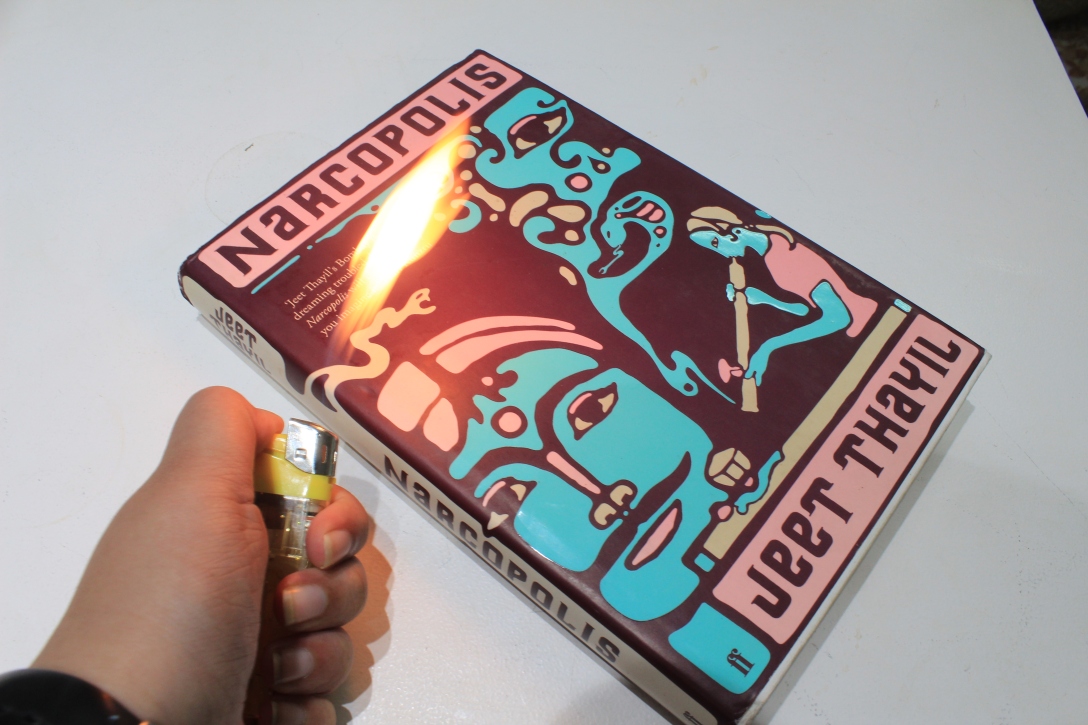Pages: 491
Genre: Fiction
Read: May 2017
Rating: 9/10
With every book you read, you can always find something that went wrong – something you didn’t like. When I read Narcopolis, I couldn’t find any.
The book had me hooked from the first paragraph. I remember being tired. I had comeback from a long day at work and I had hardly slept the night before. I was ready to sleep at 10. I read the first page and suddenly, it was 1.
The book starts off with a bang with probably the best prologue I have read recently. It was very surreal and gave me ‘Alice in Wonderland’ vibes. It was as if I had landed in a strange place and was having a conversation with a person with two heads. I can’t explain it to you. You have to read it for yourself.
This book, divided into 4 parts, speaks of Bombay (known as Mumbai now) and it’s opium epidemic during the 1970s to the almost present time. Different characters, mostly all drug addicts, take you from Bombay to LA to China and tell you seemingly disjointed stories.
What makes it seem ‘disjointed’ is that the book doesn’t have one narrator but many. They randomly change with no announcement. But to me, it felt natural. It flowed into the narration of the book and wasn’t jarring or confusing. The different narrators told stories of many other people, not just themselves. Sometimes one narrator narrated the story of another!
Sounds confusing right? But it wasn’t. And that’s the beauty of it! It really takes the theory of an ‘unreliable narrator‘ and adds multiple dimensions to it.
What I also loved about the book was that it was set in Bombay and the places the author mentioned are 100% authentic. Things like Marine Drive, Colaba, Regal – are common knowledge. The Chinese Graveyard in Sewri, Shuklaji Street, however, are not.
Not only were the places authentic but also the things happening around the time. I really liked that they depicted what it was like during the ’93 Bombay Riots. Though not a deep dive, but it was a description of the landscape through the eyes of the narrators.
I really can’t pinpoint what exactly made me love this book so much. Maybe it was the joy of reading ‘unreliable narrators’. Maybe it was because the book is set in the city I live in. Maybe it’s the poetic ramblings that caught my attention. Maybe it was what the ramblings were about – sex, drugs, religion, gender identity, violence, murder. So much! I can not say for sure. But what I do know is that reading this book was an amazing experience and I can’t wait to repeat it again.
P.S. Fair warning though, I do not think many of the non-Indians would appreciate this book. It has a lot of slang, language and pop culture that others may not understand.
Favourite Quotes:
“You’ve got to face facts and the fact is life is a joke, a fucking bad joke, or, no, a bad fucking joke. There’s no point taking it seriously because whatever happens, and I mean whatever the fuck, the punch line is the same: you go out horizontally. You see the point? No fucking point.”
“We’re waiting for a glance or a word, some acknowledgement that we are here.”
“For every happiness there is an equal and opposite unhappiness.”
“Doubt is another word for self-hate, because if you doubt yourself and your position in the world you open yourself to failure. You are the carrier of a virus and you’re contagious and you should be put down, because doubt is the most dangerous indulgence of them all, most dangerous than vanity or green, because doubt feeds on itself like cancer or tuberculosis, and unlike the sufferers of such ailments, the doubter does not deserve sympathy: doubt is a decision.”
[about Mumbai] “The city claimed seven islands from the sea. In the rainy reason, the sea claimed them back.”
“It is a funny thing, only the uneducated set so much stock by education. When you go to school you realize how little it means, because the street belongs to whoever takes it.”
“Correct me if I’m wrong, but isn’t it true that men aren’t interested in tenderness as much as orgasm? Isn’t it true that the main goal of the sexual act, for a man, is the discharging of the semen into a suitable receptacle, or even an unsuitable one if nothing else is available?”
“For conversation, better to be a woman, for everything else, for sex, better to be a man.”
“But there’s no use saying this to you. You’ll only misunderstand and misquote me, and I will end up sounding pompous or foolish, which is really the same thing.”
“‘Kaam’, said Bengali, as if to himself, ‘is work in Hindi, but desire or lust in Sanskrit. So kaamvali has a double meaning, which this gentlemen is doubtless aware of.'”
